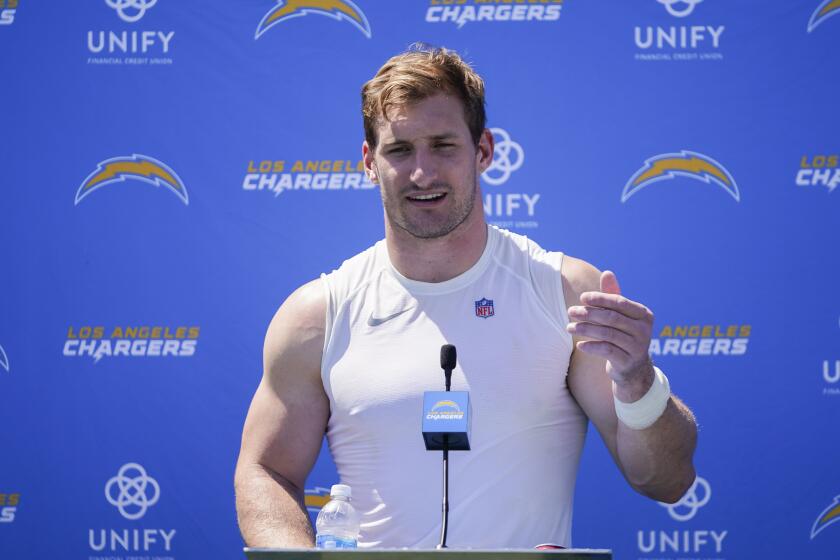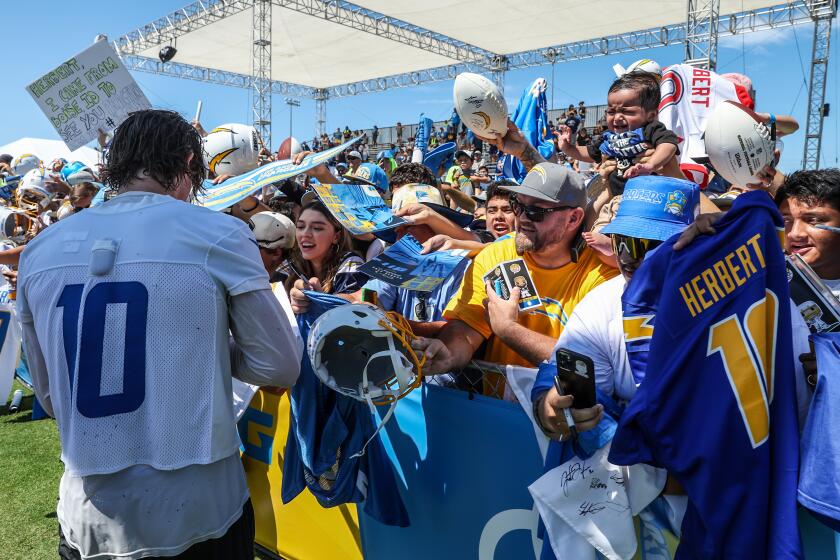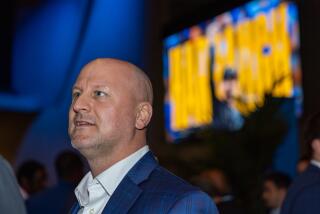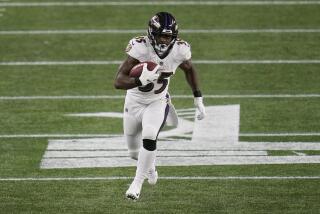Chargers’ Austin Ekeler takes run at changing market for underappreciated backs
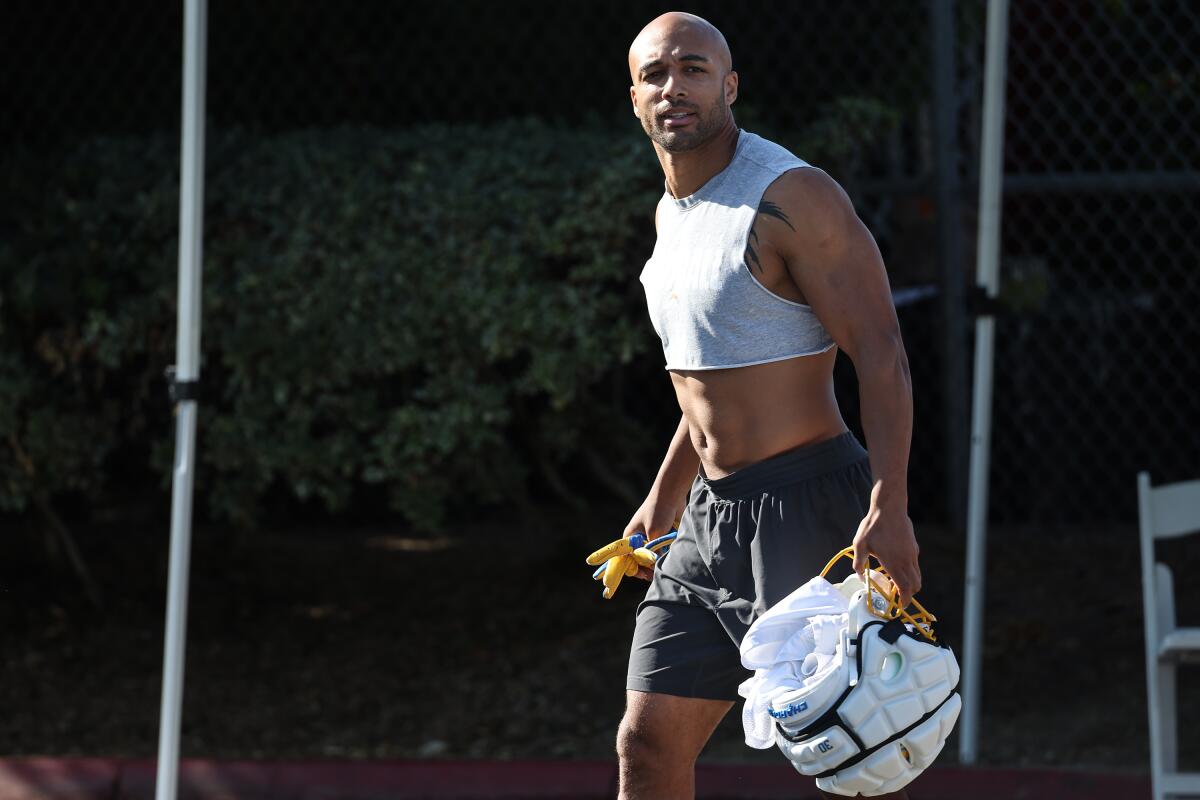
- Share via
Austin Ekeler is accustomed to finding ways around or through obstacles.
Undrafted out of Western State (now Western Colorado University), he had to convince disbelievers he wasn’t too small to be an effective NFL running back.
He capitalized on Melvin Gordon’s 2019 holdout to take on an ever-growing role, and with more than 1,500 scrimmage yards each of the last two seasons — including career bests of 915 yards rushing and 13 touchdowns rushing last season — he has been a significant asset to the Chargers both on the field and off, through his social media interactions and in the community.
It’s his misfortune that the market for NFL running backs has bottomed out, especially for long-term deals.
Once considered glamorous and paid at a level to match, running backs have become disposable in a now quarterback-centric game. Discarded at the least sign of wear and tear, their shelf life evaporated. That gave Ekeler little leverage after last season when the Chargers refused to extend his contract but gave him permission to explore a trade. Dynamic though he is, the “demand” part of supply and demand simply wasn’t there.
He eventually went back to the Chargers, who gave him a sweetener of $1.75 million in incentives for the final year of his four-year, $24.5-million contract.
“They didn’t have to do what they did, so I’m very appreciative of this organization for saying, ‘Look, we’re not going to do what you want to do, but here’s at least something,’ ” he said the other day. “It’s a start. For me, that’s what I’m appreciative of.”
But he hasn’t given up on trying to shift the market toward better paydays for running backs, and he’s willing to face a new set of obstacles to do it.
Joey Bosa has not been happy with his play against the run the last few seasons, so he has bulked up and streamlined his hair in attempt to bolster Chargers’ maligned defense.
Before NFL training camps opened, Ekeler organized a video meeting that included Christian McCaffrey of the San Francisco 49ers, Saquon Barkley of the New York Giants and Nick Chubb of the Cleveland Browns to brainstorm how they can divert the NFL’s economic steamroller to more fairly reward running backs. Barkley, as with 2022 rushing leader Josh Jacobs of the Las Vegas Raiders, was designated with a franchise tag and automatic one-year deal.
“These are things that you have to have discussions about, see what people are willing to do, in all different situations, because they’re different,” Ekeler said. “People want to hold out, or maybe they don’t. You have to have those discussions. We don’t know, that’s why we get together and see what is going through their minds. We’ll have more of those to continue to educate and continue to make sure that we can put ourselves in a position — as a collective, not just running backs, as an entire union — to go forward and protect ourselves, as players.”
They emerged with a focus on two key issues.
“One of those things that we can do right now, in the short term, is continue to put the narrative out of why we are important,” said Ekeler, who had 18 touchdowns total last season, most in the NFL. “We’re starting to put out this narrative that is kind of combating against what has been out there so far in a lot of different scenes, where there’s a lot of different media trying to justify why the running backs aren’t getting paid.
“They’re using these general numbers of what, for example, this is what the running game efficiency does in accordance to the passing game efficiency, but it goes deeper than that.
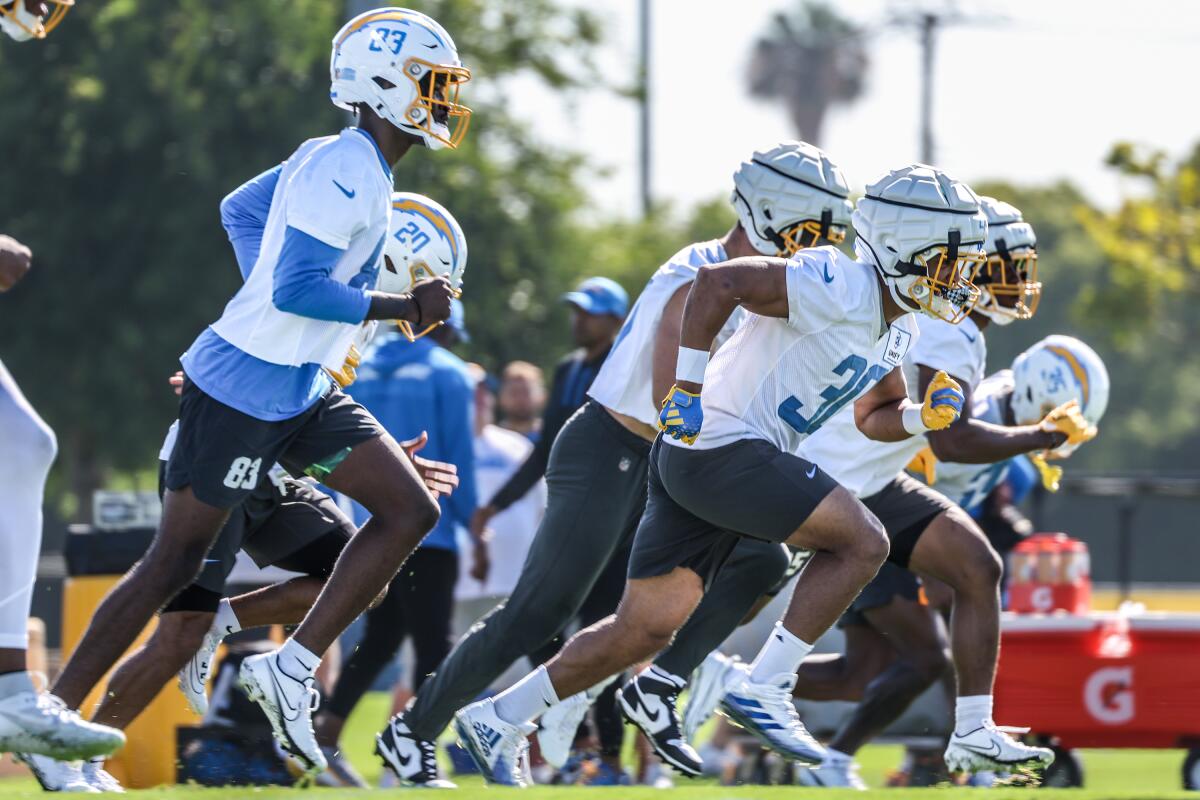
“We’re not just numbers on a page, we’re actual players and we all have different impacts on each team, so it’s very situational, as far as what a specific player can have as far as impact on each team. That means that their value isn’t tied to a general rule of statistics that you see.”
The other key issue is to explore whether players have an appetite for fighting the franchise tag, which is embedded in a collective bargaining agreement that runs through March of 2030.
The franchise tag, Ekeler said, puts all the risk on the player on a one-year deal.
“If Saquon Barkley runs for 3,000 yards, they might franchise him again, and out of principle you’re not allowing these guys to actually go out and find value for themselves,” Ekeler said. “It seems like a very one-sided option that’s in the CBA.
“It could happen to any position group. We’re just the ones that it’s playing out through right now. It comes down to us being a union, so we have to put all of the things that we want to see changed in the future on the table, then, is this something that is worth fighting for or is it not?”
Quarterback Justin Herbert is in his happy place in L.A., signed through 2029 with a huge contract and ready to lead the Chargers with his prolific throwing arm.
Ekeler balances so many of his aspects so well that it’s easy to believe him when he said he can separate business concerns from his performance, and he was in a good mood Thursday after the second day of training camp. He’s optimistic about what’s in store from new offensive coordinator Kellen Moore, and he was gushing after watching quarterback Justin Herbert repeatedly air out some dazzling throws.
“We were making plays, guys were flying around, we were having fun,” Ekeler said. “Guys are healthy right now, so there’s this energy feel to it. Justin is balling out these first couple of days. He got his big contract. We’re going in the right direction. I feel so good about where we’re going. Kellen coming in and meshing it all together, we’ll see, time tells.”
Time changes markets, too, though probably not soon enough for Ekeler to benefit. In the meantime, piling up yards and touchdowns is the best argument he can make for that market shift to start happening.
More to Read
Go beyond the scoreboard
Get the latest on L.A.'s teams in the daily Sports Report newsletter.
You may occasionally receive promotional content from the Los Angeles Times.

